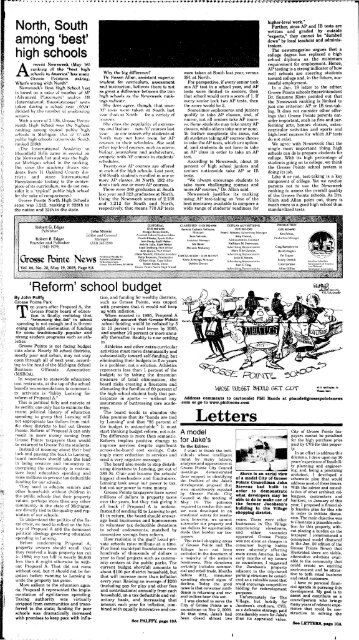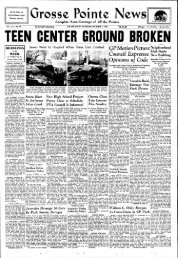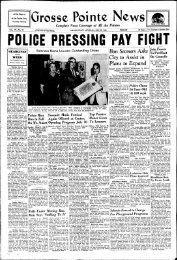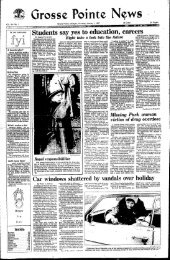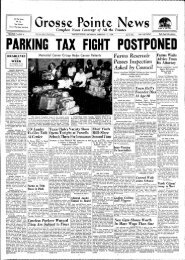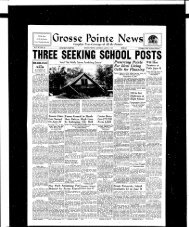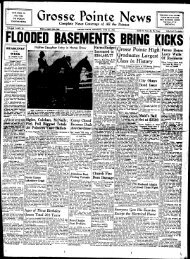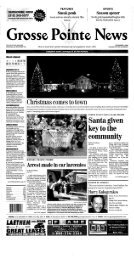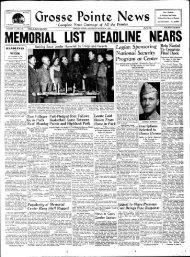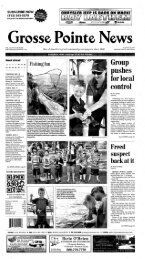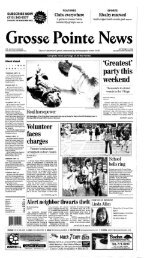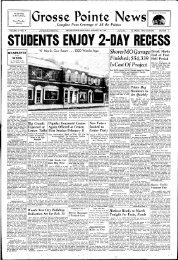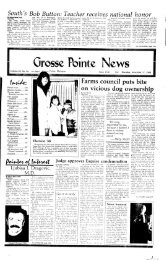Spin City: Grosse Pointe hires PR firm - Local History Archives
Spin City: Grosse Pointe hires PR firm - Local History Archives
Spin City: Grosse Pointe hires PR firm - Local History Archives
Create successful ePaper yourself
Turn your PDF publications into a flip-book with our unique Google optimized e-Paper software.
•m^w-f- »• • * • - * • • * \ t \ •*-*• + •»• >•• * •*••*• **•-»• •,.+• »-#-»-•».>->**••*•ns<br />
Sh^ v Uv\s (he popularity of astronon\\<br />
^nd itahan mm A P courses last,<br />
\s\n as ouc reason wl\v students at<br />
North may not have room for AP<br />
courses in their schedules. She said<br />
other top-level courses, such as miemh\olog\\<br />
journalism and aivhitecture,<br />
compete with AP courses in students'<br />
schedules.<br />
Twenty-one AP courses are ottered<br />
at each of the high schools. Last year,<br />
4Sti South students enrolled in one or<br />
more AP classes. At North, 282 students<br />
took one or more AP courses.<br />
There were 360 graduates at South<br />
last year and 323 graduates at North.<br />
Using the Newsweek scores of 2.138<br />
and 1.212 for South and North,<br />
respectively, that means 770 AP tests<br />
John Minnis<br />
Editor and General<br />
Manager<br />
(313) 343-5590<br />
rubliohcd Weekly by<br />
Antccbo Publishers<br />
96 Kcrchev.il Ave.<br />
<strong>Grosse</strong> <strong>Pointe</strong> Farms, MI 48236<br />
EDITORIAL<br />
(313) 882-0294<br />
Margie Reins Smith,<br />
Assistant fiditor/Foatiire Editor<br />
Chuck Klonkc, Sports Editor<br />
Ann Fouty, SUff Writer<br />
Bob St. John, Staff Writer<br />
Hrad Lirtdberg, Staff Writor<br />
BethQuinn, Staff Writer<br />
Diane Morelli, Editorial Assistant<br />
Betty Brosseau, Proofreader<br />
Gilbert Gray, Copy Editor<br />
Stefan Cross, Intern<br />
<strong>Grosse</strong> 1'oiutc North High School<br />
'Reform' school budget 5VTir-^£<br />
By John Palffy<br />
<strong>Grosse</strong> <strong>Pointe</strong> Park<br />
Ten years after Proposal A, the<br />
<strong>Grosse</strong> <strong>Pointe</strong> board of education<br />
is finally realizing that.<br />
. . > * trimming \ tin* > f at" in school<br />
spending is not enough and is threatening<br />
outright elimination of funding<br />
for some traditionally popular and<br />
strong student programs such as athletics.<br />
<strong>Grosse</strong> <strong>Pointe</strong> is not facing budget<br />
cuts alone. Nearly 50 school districts,<br />
mostly poor and urban, may not stay<br />
open through all of next year, according<br />
to the head of the Michigan School<br />
Business Officials Association<br />
(MSBOA).<br />
In response to statewide education<br />
cost restraints, at the top of the school<br />
board's recommendations to community<br />
activists is "lobby Lansing for<br />
reform of Proposal A."<br />
This is political folly and naivete at<br />
its zenith; one only has to examine the<br />
recent political history of education<br />
spending to grasp that Lansing will<br />
not expropriate tax dollars from middle<br />
class districts to bail out <strong>Grosse</strong><br />
<strong>Pointe</strong>. Reform of Proposal A can only<br />
result in more money coming from<br />
<strong>Grosse</strong> <strong>Pointe</strong> taxpayers than would<br />
be returned to <strong>Grosse</strong> <strong>Pointe</strong> students.<br />
Instead of moaning about their bad<br />
luck and passing the buck to Lansing,<br />
board members should take the lead<br />
in being creative and innovative in<br />
energizing the community to restructure<br />
local education spending and<br />
raise millions in private tax deductible<br />
funding for our schools.<br />
They need to educate seniors and<br />
other households without children in<br />
the public schools that their property<br />
values, perhaps more then any other<br />
community in the state of Michigan,<br />
are directly tied to the quality and reputation<br />
of our schools.<br />
To understand the politics of the fiscal<br />
crisis, we need to reflect on the history<br />
of Proposal A and the dominant<br />
political ideology governing education<br />
spending in Lansing.<br />
Before condemning Proposal A,<br />
property owners should recall that<br />
they received a huge property tax cut<br />
in .1994; my tax bill is nearly $6,000<br />
less than it might otherwise be without<br />
Proposal A. That did not come<br />
without cost, but it should not be forgotten<br />
before running to Lansing to<br />
undo the property tax genie.<br />
More salient to the education agenda,<br />
Proposal A represented the implementation<br />
of egalitarian spending.<br />
Taxing authority was virtually<br />
stripped from communities and transferred<br />
to the state; funding for poor<br />
schools was dramatically increased<br />
with promises to keep pace with infla<br />
tion, and funding for wealthy districts,<br />
such as <strong>Grosse</strong> <strong>Pointe</strong>, was capped<br />
with promises that it would not keep<br />
up with inflation.<br />
When enacted in 1995, Proposal A<br />
virtually assured' that '<strong>Grosse</strong> <strong>Pointe</strong> 1<br />
school funding would be reduced'by 5<br />
to 10 percent in real terms by 2005,<br />
and another 1/2 percent or more annually<br />
thereafter. Reality is now settling<br />
in.<br />
Athletics and other extra-curricular<br />
activities must move dramatically and<br />
substantially toward self-funding, but<br />
eliminating their budgets in five years<br />
is a problem, not a solution. Athletics<br />
represents less than 1 percent of the<br />
budget; so by taking the draconian<br />
measure of total elimination, the<br />
board risks creating a firestorm and<br />
alienating the families of 60 percent of<br />
the high school student body that participates<br />
in sports — without any<br />
assurances of buttressing core academics.<br />
The board needs to abandon the<br />
false premise that its "hands are tied<br />
by Lansing" and that "85 percent of<br />
the budget is untouchable." It must<br />
start thinking budget reform, not cuts.<br />
The difference is more then semantic.<br />
Reform implies positive change to<br />
improve services despite significant<br />
across-the-board cost savings. Cuts<br />
imply mere reduction in services and<br />
send a very negative message.<br />
The board also needs to stop distributing<br />
directions to Lansing, get out of<br />
389 St. Clair and become the schools'<br />
biggest cheerleaders and fundraisers,<br />
Lansing took away our power to tax,<br />
but not our power to raise money.<br />
<strong>Grosse</strong> <strong>Pointe</strong> taxpayers have saved<br />
millions of dollars in property taxes<br />
over the years, but they risk giving it<br />
all back if Proposal A is undone.<br />
Instead of sending $2 to Lansing to get<br />
$1 in return, the board should encourage<br />
local businesses and homeowners<br />
to volunteer tax deductible donations<br />
to school endowments, matched by<br />
innovative savings from reform.<br />
How realistic is the goal? <strong>Local</strong> private<br />
schools raise millions at a time,<br />
Five local municipal foundations raise<br />
hundreds of thousands of dollars a<br />
year to fund projects such as community<br />
centers at the public parks. The<br />
current budget shortfall amounts to<br />
about $100 per district household, but<br />
that will increase more than inflation<br />
every year. Raising an average of $200<br />
(including pay for play and other fees<br />
and contributions) annually from each<br />
household, on a tax deductible and voluntary<br />
basis, and increasing that<br />
amount each year for inflation, combined<br />
with equally innovative and cre-<br />
See PALFFY, page 10A<br />
were taken at South last year, versus<br />
391 at North.<br />
For perspective, if every senior took<br />
one AP test in a school year, and AP<br />
tests were limited to seniors, then<br />
that school would earn a score of 1. If<br />
every senior took two AP tests, then<br />
the score would be 2.<br />
Sometimes sophomores and juniors<br />
qualify to take AP classes, and, of<br />
course, not all seniors tako AP courses.<br />
Some students may take many AP<br />
classes, while others take one or none.<br />
IV) further complicate the issue, not<br />
all students taking AP courses choose<br />
to take the AP tests, which are optional,<br />
and students do not have to take<br />
an AP class in order to take an AP<br />
test.<br />
According to Newsweek, about 15<br />
percent of high school juniors and<br />
seniors nationwide take AP or IB<br />
tests.<br />
"We always encourage students to<br />
take more challenging courses and<br />
more AP courses," Dr. Allan said.<br />
Newsweek justifies its ranking<br />
using AP test-taking as "one of the<br />
best measures available to compare a<br />
wide range of students' readiness for<br />
CLASSIFirD -


